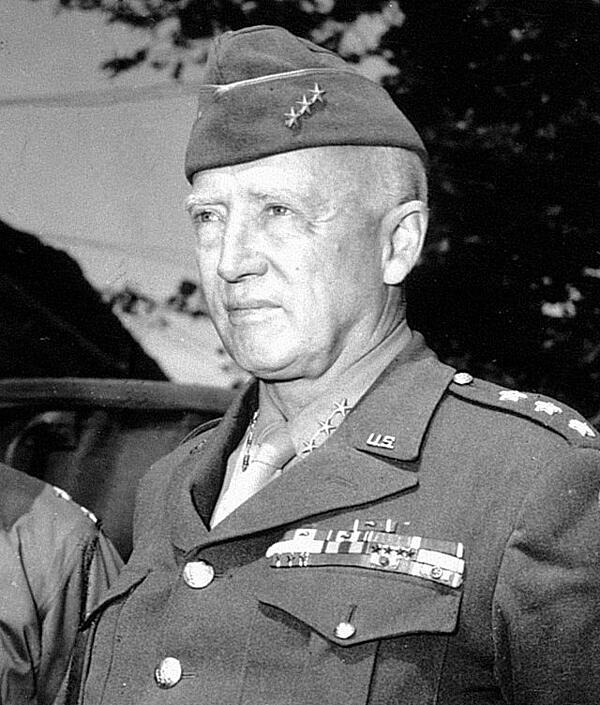George Patton
George Patton was a pugnacious and controversial American general who served in both World Wars. He famously proclaimed that a ‘pint of sweat will save a gallon of blood’.
Californian born George Patton was educated at the Virginia Military Institute and the U.S Military Academy. He graduated in 1909 and three years later competed in the Modern Pentathlon at the Olympics. In 1916 he was appointed as as an aide-de-camp to General Pershing during the Pancho Villa Expedition in Mexico.
When World War One was over, Patton had set up a tank training school. The new frontier of armoured warfare helped Patton establish his name. Dwight Eisenhower, future Supreme Commander of Allied forces during World War Two, was a training officer at the same camp. Between the wars, Patton continued to promote and develop armoured warfare. When the United States declared war in late 1941, Patton was commander of the U.S 2nd Armoured Division.

During the war, Patton served in North Africa, Sicily and Western Europe. He led the successful invasion of Casablanca during Operation Torch in 1942. In March 1943, the U.S.II Corps were defeated by Nazi Germany’s Afrika Korps at Kasserine Pass. In the wake of this defeat, Major General Lloyd Fredendall was replaced by Patton as leader of the II Corps. Patton had 10 days before the next attack to create a more efficient fighting unit. He brought in strict rules, disciplined schedules and even stipulated that soldiers wear clean and neat uniforms. In March 17, his corps helped win the Battle of El Guettar.
Later in 1943 Patton took part in Operation Husky, the Allied invasion of Sicily. He was tasked with commanding the Seventh United States army and supporting Bernard Montgomery’s Eighth Army. Harold Alexander was in overall control of both armies.
By August 1943 Operation Husky’s strategic goals had been met, but Patton’s behaviour during the invasion raised the hackles of some military figures. During his attack on Messina in July, he ignored Harold Alexander’s orders to limit the scale of the attack until the city had fallen. When he was told of the massacre of 73 unarmed Italian and German Prisoners of War by American troops, Patton wrote in his diary "I told Bradley that it was probably an exaggeration, but in any case to tell the officer to certify that the dead men were snipers or had attempted to escape or something, as it would make a stink in the press and also would make the civilians mad. Anyhow, they are dead, so nothing can be done about it." Omar Bradley did not follow these suggestions.
Patton hit two of his subordinates (Private Charles H.Kuhl and Private Paul G. Bennett) who had been hospitalised for battle fatigue during the invasion of Sicily. Patton did not countenance hospitalisation for non-physical complaints. These incidents were revealed in the American media by Drew Pearson, causing a national furore. Patton was not sacked, but Commander in Chief Eisenhower chastised his behaviour and force him to apologise to the privates. Patton did not see battle action for nearly a year after this episode.
Patton commanded the Third Army during the invasion of Normandy. The Third Army Group pushed through the Germans defences at Normandy and made a path across Northern France. It encountered German resistance at the Battle of the Bulge in December 1944, but by February 1945 the German army was in retreat and by March 1945 the Third Army crossed the River Rhine.
Between the D-Day Landings of August 1944 and the end of war in Europe in May 1945, Patton’s third army was in continuous combat for nearly 300 days.
After the cessation of hostilities in Europe, Patton became military governor of Bavaria. He ended up being removed from this post for being ‘too soft’ on the Germans: this was possibly because Patton was now more worried about Russians than the defeated Nazis. He was killed in a road crash on 21 December 1945, at the age of 60.
See also: Arthur Percival
MLA Citation/Reference
"George Patton". HistoryLearning.com. 2026. Web.
